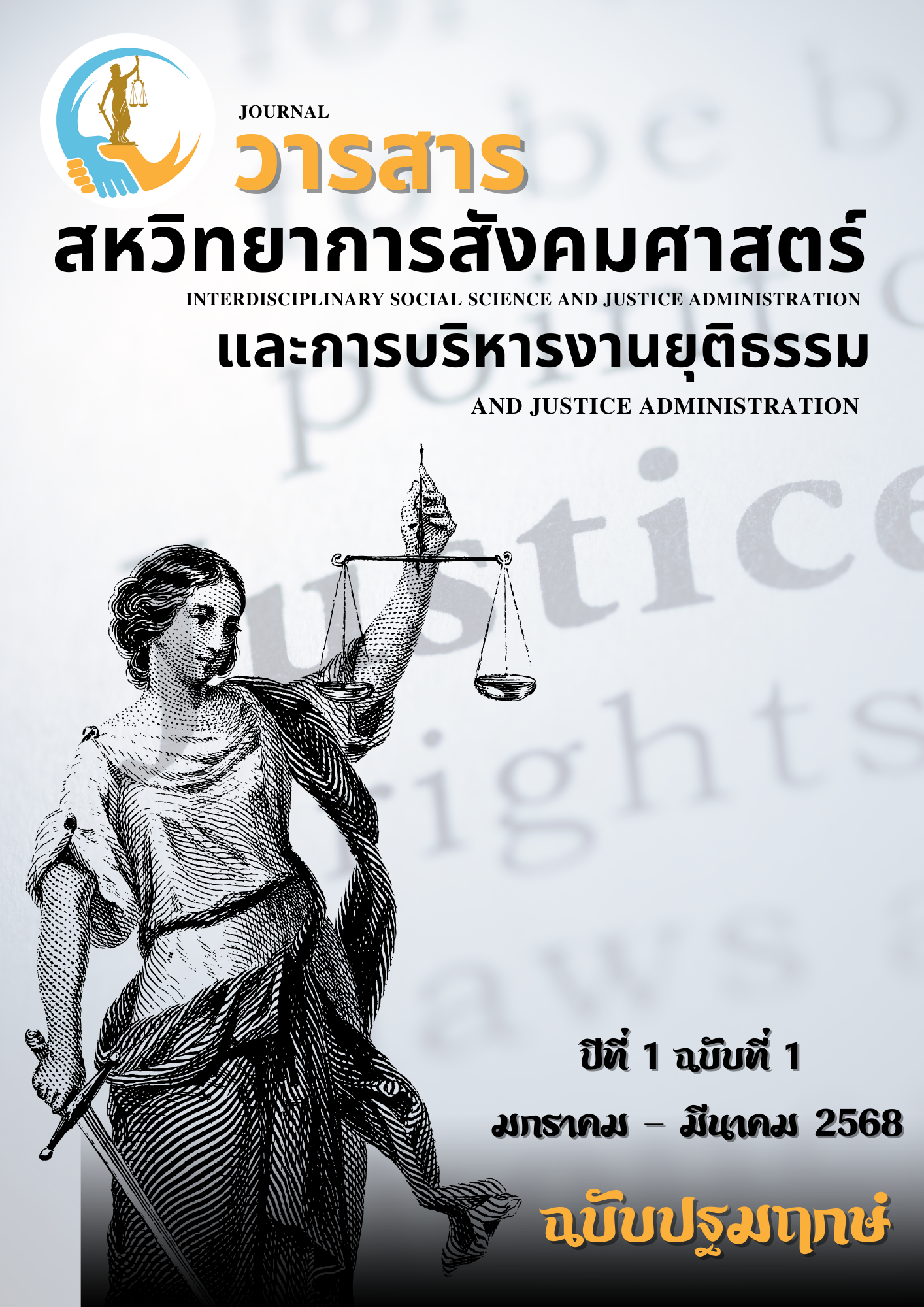ปฏิสัมพันธ์ระหว่างพุทธศาสนากับสังคมไทย
Main Article Content
บทคัดย่อ
บทความวิชาการนี้ มีวัตถุประสงค์เพื่ออธิบายปรากฏการณ์ระหว่างพุทธศาสนากับสังคมไทย และศึกษาปฏิสัมพันธ์ระหว่างศาสนากับการพัฒนาคนและการพัฒนาสังคม การศึกษานี้มุ่งเน้นความสัมพันธ์ระหว่างพุทธศาสนากับการพัฒนาสังคมไทย ผลการศึกษาพบว่า พระพุทธศาสนามีบทบาทสำคัญในการพัฒนามนุษย์ใน 5 ด้าน ได้แก่ ด้านกาย ศีลธรรม จิตใจ ปัญญา และอาชีพ วิถีชีวิตดั้งเดิมของคนไทยเกิดจากการผสมผสานระหว่างศาสนาและกสิกรรม ส่งผลให้มีความเรียบง่าย เอื้อเฟื้อเผื่อแผ่ และมีความ สัมพันธ์อันดีกับธรรมชาติ พุทธศาสนาในประเทศไทยมีเอกลักษณ์จากการผสมผสานความเชื่อจาก 3 ส่วนสำคัญ คือ ลัทธิผีสางเทวดา ศาสนาพราหมณ์ และพระพุทธศาสนา พระสงฆ์และพุทธบริษัท 4 มีบทบาทสำคัญในการนำหลักธรรมไปประยุกต์ใช้เพื่อพัฒนาสังคม เป้าหมายสูงสุดของการพัฒนาสังคมตามแนวพุทธศาสนา คือ การอยู่ร่วมกันโดยสงบสุข ซึ่งหมายถึง การที่สมาชิกในสังคมมีคุณภาพชีวิตที่ดี มีศีลธรรม มีจิตใจที่เข้มแข็ง มีปัญญา และสามารถพึ่งพาตนเองได้ สังคมที่พัฒนาตามแนวพุทธศาสนาจึงเป็นสังคมที่มีดุลยภาพระหว่างการพัฒนาทางวัตถุและการพัฒนาทางจิตใจ อันนำไปสู่ความสงบสุขและความยั่งยืน
Article Details

อนุญาตภายใต้เงื่อนไข Creative Commons Attribution-NonCommercial-NoDerivatives 4.0 International License.
บทความนี้ได้รับการเผยแพร่ภายใต้สัญญาอนุญาต Creative Commons Attribution-NonCommercial-NoDerivatives 4.0 International (CC BY-NC-ND 4.0) ซึ่งอนุญาตให้ผู้อื่นสามารถแชร์บทความได้โดยให้เครดิตผู้เขียนและห้ามนำไปใช้เพื่อการค้าหรือดัดแปลง หากต้องการใช้งานซ้ำในลักษณะอื่น ๆ หรือการเผยแพร่ซ้ำ จำเป็นต้องได้รับอนุญาตจากวารสารเอกสารอ้างอิง
Chanklum, S. (2022). The Worldly Vicissitude and Understanding of Life in Modern Society, Journal of Philosophical Vision, 27(2), 249-260.
Chanraeng, T. (2019). History of Buddhism in Lanna: an analysis data from manuscripts and archeological sources. Journal of Buddhist Studies, 10(1), 39-50.
Dahle, J. & Caesar, R. (2011). History of Buddhism in Thailand. https://maytermthailand .org/2011/04/30/history-of-buddhism-in-thailand-by-rob-caesar-and-jane-dahle/
Dharmânanda, W. (2006). Buddhism in three southern border provinces before the 13th century: the Study from archaeological evidences. https://soreda.oas.psu.ac.th/ show_detail.php?research_id=398
Kuppako, D. (2014). The Buddhist cultures in Thai society: Happy and harmonious society. Journal of MCU Social Science Review, 3(3), 92–119.
Kurzydlowski, C. (2022). Is Thailand’s Buddhist sangha undergoing a political sea change. https://thediplomat.com/2022/02/is-thailands-buddhist-sangha-undergoing-a-politi cal-sea-change/
Lapthananon, P., Panyachit, S. & Wanitchanon, P. (2021). Sociology of Socially Engaged Buddhism: The Analytical Study for Social Welfare of Thai Sangha. Journal of MCU Social Science Review, 10(2), 25-38.
Larsson, T. (2018). Buddhist bureaucracy and religious freedom in Thailand. Journal of Law and Religion, 33(2), 197 – 211.
Mark, J. J. (2020). Buddhism. https://www.worldhistory.org/buddhism/
Meethaisong, T. (2019). The adaptation of Isan Buddhism in the midst of propagation of the concept of forest Monks in Dhammayuttikanikaya. Journal of Language, Religion and Culture, 8(1), 156-175.
National Geographic. (2023). Buddhism. https://education.nationalgeographic.org/resource/ buddhism
Pafan, K. (2016). The role of temples in Thai society. https://learnthaistyle.com/the-role-of-temples-in-thai-society/
Parnwell, M. & Seeger, M. (2008). The relocalization of Buddhism in Thailand. Journal of. Buddhist Ethics, 13, 79-176.
Phrakhru Kosolthammanusith, Phrakhru Suthapornphisuth & Phrakhru Phiphatnawutikon. (2019). Buddhism and Thai Society Development,Thailand 4.0. Veridian E-Journal, Silpakorn University (Humanities, Social Sciences and arts), 12(4), 1524-1539.
Phra Palad Mathee Khemapanyo & Kulpa, N. (2020). Buddhist possibility in thai society. Journal of Humanities and Social Sciences Surin Rajabhat University, 22(2), 149-160.
Phar Kittakorn Jutakiat & Lapthananon, P. (2021). Buddha Nature in Mahayana Buddhist Scriptures and Perception of Chinses Order of Sangha in Thailand in Order to Promote Human and Social Deveopment. Journal of Suvarnabhumi Institute of Technology (Humanities and Social Sciences), 7(2), 481-497.
Phra Maha Wichien Wachirathammo, Somnuk Kulmanee, Angkarn Kanchanaphet & Phrakru Suttakit Samosorn. (2021). The role of monks in modern Thai society development. Journal Maha Chula Thani Mahachulalongkornrajavidyalaya University, 3(6), 42-49.
Phra Roem Khaitakhop Nalinthip Pimklat & Kingkaew Patitungkho (2017). Guideline for participation in event the important Buddhist days between temples and communities. Veridian E-Journal, Silpakorn University, 10(1), 1895-1907.
Puntarigvivat, T. (1998). Toward a Buddhist social ethics: The case of Thailand. Cross Currents, 48(3), 347-365.
Sangkhamanee, P., Waewsriand, P., & Chaiha, A. (2021). Temples as the source of building happiness of community in Thai society. Ratanabuth Journal, 3(2), 49-62.
The Sarojin. (2020). Buddhism in Thailand. https://www.sarojin.com/en/blog/khao-lak-resort-buddhism-in-thailand/
Ya-in, P. & Sin-ampol, P. (2018). Socio-cultural interactions and representation of space to Chamadivi temple. Journal of Community Development Research (Humanities and Social Sciences), 11(1), 48-61.


